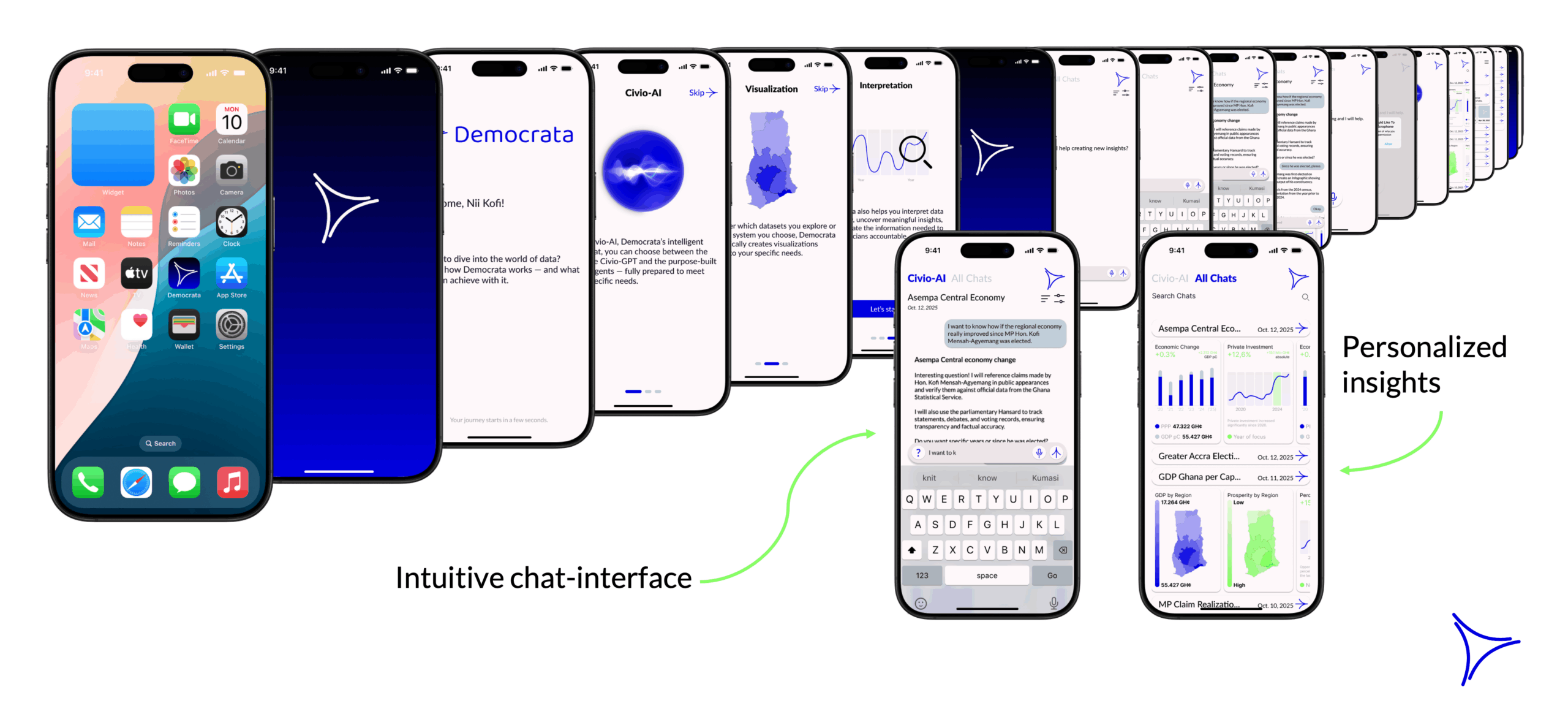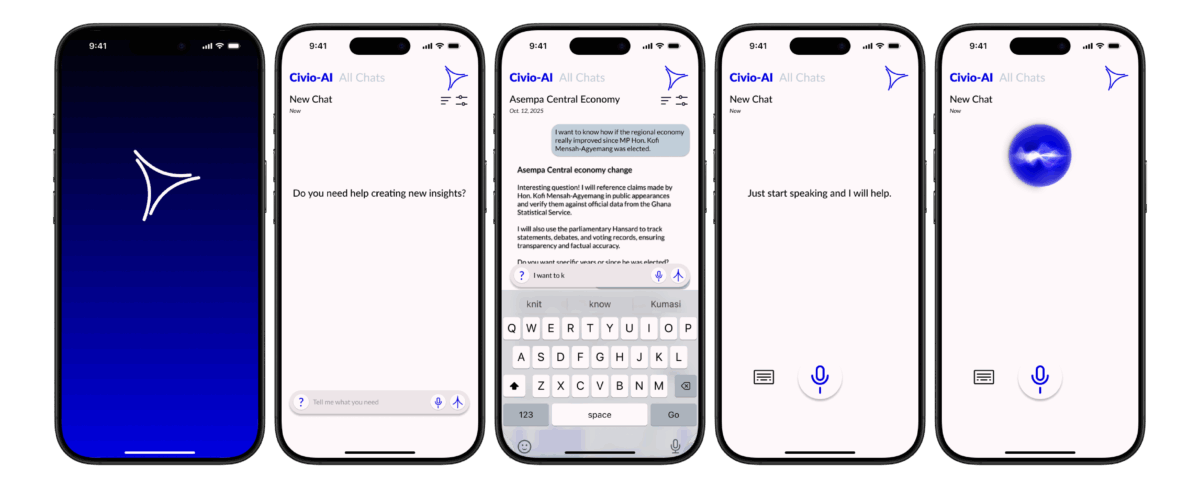
Democrata –– Big Talks. Simple Stats.
by Team YA-DK-3
The following blog post is a concept description of the team YA-DK-3 as part of
the Next Generation Digital Action course. In close collaboration with the Ghana
Statistical Service, Parliament of Ghana, Danish Embassy to Ghana and the two
Danish universities RUC, as well as DTU, we had the great opportunity to
analyze the current system. With all this support we developed a multilayer
concept, which unites data infrastructure, user experience and a future vision
of a digitalized, approachable democracy.

Problem: The Transparency Trap
In Ghana, the Parliament documents every session in detailed records called Hansards. While these records are comprehensive, they are currently published as long, text-heavy PDF files that are difficult to navigate. For citizens interested in following debates or understanding legislative processes, the sheer volume and format of these documents can feel overwhelming and discouraging.
Despite Ghana’s high mobile phone ownership and ambition to become a hub for digitalization, the current system is not optimized for mobile use. There is also a lack of standardization of data formats, which makes searching, cross-referencing or visualizing information nearly impossible in everyday scenarios.
This “transparency trap” creates a gap between citizens and their democracy. People who want to engage are forced to spend hours sifting through documents or rely on second-hand summaries, limiting their ability to form informed opinions or participate meaningfully. Democrata seeks to bridge this gap by making parliamentary data approachable, interactive, and easy to explore.
Citizens must have the ability to easily access information[…]
Agora, Portal for Parliamentary Development
Solution: Democracy, Designed Differently
To address the transparency trap, we designed Democrata as a citizen-centered platform that combines structured data, AI and a mobile-first interface. The solution rests on three pillars, each building on the previous to create a system that is robust, engaging as well as future-ready.
Three Pilars

Infrastructure and Standardization
A reliable foundation is essential for Democrata to function effectively. This includes converting Hansards from PDFs into structured, searchable data, integrating statistics from the Ghana Statistical Service and creating a centralized data “warehouse”. Standardized metadata and semantic indexing allow documents to be cross-referenced, enabling users to quickly find relevant information without technical barriers.
Accessible Experience
Democrata is designed for every citizens, not just experts. The platform offers a mobile-first Progressive Web App (PWA) with an intuitive interface and accessibility features such as voice input, dark mode and low-data operation. Users can browse preset statistics, visualize debates through charts, or interact with an AI assistant that answers questions, summarizes discussions and generates custom insights like highly personalized charts.

Future Opportunities
Beyond current functionality, Democrata is built to grow. The platform will be able to incorporate real-time debate summaries, personalized notifications, educational interfaces for schools and public APIs for civic-tech development. By laying an utmost flexible foundation, we enable continuous innovation that strengthens citizen engagement and supports an inclusive digital democracy.
Sustainable Development Goals
Furthermore, Democrata’s mission to drastically increase transparency in the legislative process and improve access to statistical data directly aligns with several UN Sustainable Development Goals (SDGs). In particular, it contributes to SDGs 8 (Decent Work and Economic Growth), 9 (Industry, Innovation and Infrastructure) and 10 (Reduced Inequalities), while also indirectly supporting the advancement of SDGs 3 (Good Health and Well-Being), 4 (Quality Education), and 5 (Gender Equality).








How Democrata Works
Democrata brings together advanced data processing, AI technology and accessible design. The system is built in three layers; backend, AI engine and frontend, all supported by strong security standards and universal user experience principles.
Backend
At its core, Democrata transforms unstructured parliamentary records into structured data. Using natural language processing (NLP) and optical character recognition (OCR), Hansards are converted from long PDF files into searchable, well-organized documents. These are combined with statistical data from the Ghana Statistical Service and stored in a centralized data “warehouse”. Metadata and semantic indexing make it possible to connect documents across debates, topics and time periods.
AI Engine
The application layer powers Democrata’s intelligence. Through APIs and an integrated AI assistant, citizens can ask questions about debates, search for legislation, or request visual summaries. The AI draws from both parliamentary data and official statistics, ensuring precise and contextual answers. It can generate charts, highlight key themes and point users toward related records or discuss and explain findings.
Frontend
The user-facing side of Democrata is a mobile-first Progressive Web App designed for simplicity and accessibility. Citizens can browse official statistics, explore debates, or directly interact with the AI assistant. Features like low-data mode, voice commands and personalized feeds ensure that people across different regions and backgrounds can benefit from the platform.
Security and Trust
Transparency only works if citizens can trust the system. Democrata follows Ghana’s digital strategy and international standards for secure data access. Sensitive information is anonymized where necessary and all connections are encrypted. Strong authentication protocols ensure that data remains protected while staying open and accessible for public use. Also the datasets used are verified by GSS and the office of Handsards.
Designing for Everyone
Democrata was developed with inclusivity at its core. The goal is not only to provide access to data but to ensure that all citizens, regardless of age, education, or digital literacy, can meaningfully engage with democratic processes.
Universal design principles guided every iteration of the platform. Accessibility features such as voice interfaces, low-data usage and clear visual communication make Democrata usable in diverse contexts, from urban centers to rural areas. Continuous stakeholder involvement, including feedback from civil servants, students as well as everyday citizens, ensures that the system reflects real needs rather than assumptions.
By combining technical innovation with human-centered design, Democrata goes beyond presenting statistics and debates, it empowers people to interact with democracy on their own terms.

Future Vision: Democracies Possibilia
Democrata is more than a tool for today, it is a platform for the future of democratic engagement. By establishing strong foundations of structured data and accessibility, the system is designed to continuously evolve with new technologies and citizen needs.
Imagine an AI that follows parliamentary debates in real time and delivers personalized digests to citizens. Picture an interactive installation in the Parliament foyer, where schoolchildren can explore laws and debates through touch and voice interaction. Envision civic developers building community apps powered by open Democrata APIs, creating a broader ecosystem of democratic participation.
The possibilities are vast. Democrata does not seek to define the endpoint of digital democracy but to open pathways, leaving space for innovation, experimentation and shared ownership in shaping the future.
Creators: Our Team
Our team brings together diverse backgrounds in design, data science, and policy, united by a shared ambition: to make democracy more transparent, accessible, and engaging for all citizens. Through interdisciplinary collaboration and continuous dialogue with stakeholders, we created a concept that bridges technical feasibility with human-centered design.
References
1: https://www.britannica.com/facts/Ghana
2: https://www.archyde.com/ghana-digital-economy-3-4b-potential-by-2029/#google_vignette
3: https://www.agora-parl.org/resources/aoe/transparency-parliament
SDGs: https://www.un.org/sustainabledevelopment/news/communications-material/



